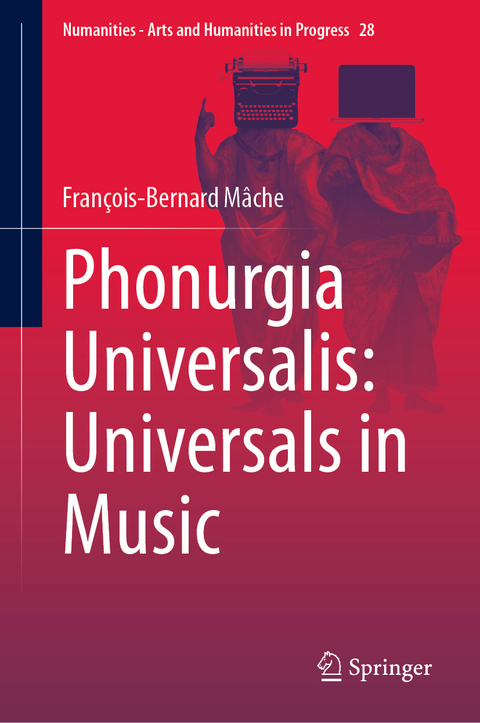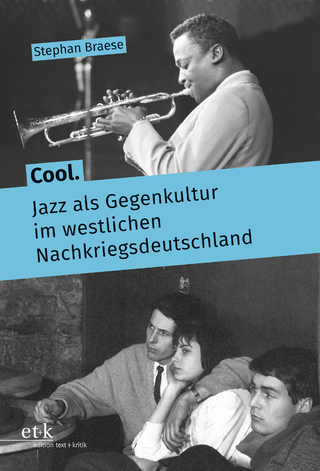
Phonurgia Universalis: Universals in Music
Springer International Publishing (Verlag)
978-3-031-58508-1 (ISBN)
This translation of Musique au singulier (2001) from the French identifies what is common to music of all times and cultures. The author, François-Bernard Mâche is a composer and internationally renowned musicologist. He addresses the question of universals in music and demonstrates how musical play is a poetic and natural game that already takes shape in the animal world. Mâche invites the reader to reconsider the traditional opposition between nature and culture and to reflect on experiencing such intense emotions when both listening to and manipulating sounds. This title appeals to students and researchers working in musicology.
Born April 4, 1935 into a family of musicians. Studies with Messiaen at Paris Conservatoire. Former student in classical literature at the Ecole Normale Supérieure (Greek archaeology, Agrégation de Lettres classiques). member of the Académie des Beaux-Arts since 2002, where he occupies the chair left by Iannis Xenakis. Grand Prix National de la Musique (1988), the Grand Prix de la Musique Symphonique from SACEM (2002), Prix du Président de la République 2022. Officer of the Légion d'honneur. As a writer, his main books are Musique, mythe, nature ou les dauphins d'Arion (1983, third edition Aedes musicae 2015 ), which founded a new discipline named Zoömusicology; Italian and English translations (1992, 1993); Musique au singulier (2001, Odile Jacob) and F-B.Mâche, la musique, la nature, les oiseaux, entretiens avec Bruno Serrou, (Ina, Michel de Maule 2007). He taught at Middlebury College and Sarah Lawrence College in 1968 and classical French, Greek and Latin literature at the Lycée Louis-le-Grand in Paris from 1968-83. He then taught musicology at the Université de Strasbourg from 1983-93, and served as director of studies at the École des Hautes Études en Sciences Sociales in Paris from 1993-97. He has lectured widely, notably in China, U.S.A., Argentina, Mexico, Estonia, Italy, Poland, Portugal, Israel, Venezuela, and elsewhere
1 Theme The Search for the Universal.- 2 Analysis Distributional analysis, advantages and limitations Its provisional relevance in the search for archetypes.- 3 Animal polyphonies Universality of polyphonies Analogy with animal choirs and duets Possible purposes.- 4 Archetype Where to look for the models of human musical nature?.- 5 Convergence Analogies or homologies between animal signals and human music The shortcomings of culturalism, and in particular of diffusionism.- 6 Fixed forms The formal organisations of poems are sonorous and concern the problem of the common origins of music and language The forms of repetition constitute their essential part.- 7 Genotype Shorthand and programmes Animal and human examples of alternation and conflict.- 8 Innate Interaction of the innate and the acquired Archetypes as innate schemes.- 9 Language and music Hypothesis of common origin, explaining strong formal analogies Mantras, glossolalies, lettrism Language models for the composer.- 10 Litany Close union of language and music in the litany The four magical, laudative, didactic and rhetorical functions, and their links with musical forms.- 11 Models Pure music or external models Antiquity of problems, from Plato to Rousseau Global models and analysis.- 12 Modernity Modernity and individualism Post-modernity and pastism.- 13 Myth Mythical level and archetype Evolutionism and transmission of archetypes Myth as a minimum common to all cultures.- 14 Nature Noise and nature Culturalism and naturalism Third phenomenological way.- 15 Ostinato Primary impulses and cultural developments of ostinato.- 16 Phenotype: The universality of certain sound forms refers to universal processes These alone can explain the very strong similarities found in cultures with no historical contacts.- 17 Playing music Communication and playing associated with the source of the music Music and sound ecology.- 18 Refrain Refrain and stanza Formalism and expression across different languages and poetic and musical styles Problems of multiple and varied refrains The refrain as a way of controlling time.- 19 Repetition A musical universal of primary importance A musician's reading of some metaphysicians and aestheticians Repetition, innovation, learning: music as an image of life.- 20 Speaking instruments A brief overview of whistled and drummed languages, etc, at the crossroads of play, language and music.- 21 Strophe A universal form, also present in many bird songs Phenotype or genotype?.- 22 Style From impersonal archetype to originality Archetypes and stereotypes: the need for a hierarchy of values.- 23 Universal The need for a universal musicology Methods of approach and criteria of universality: phenotypes, genotypes, archetypes.- 24 Variation Synthesis of myth and history The "material" as a reification of schemas from the unconscious, and variation as a conscious treatment Failure of music where nothing varies as well as music where everything varies Universality of certain processes of variation.- 25 Zoömusicology New bioacoustic knowledge and musicological skills Distributional analysis and acoustic and functional categorisation Animal syntagms and paradigms, musical analogies.
| Erscheinungsdatum | 21.06.2024 |
|---|---|
| Reihe/Serie | Numanities - Arts and Humanities in Progress |
| Zusatzinfo | XII, 238 p. 23 illus. |
| Verlagsort | Cham |
| Sprache | englisch |
| Maße | 155 x 235 mm |
| Themenwelt | Kunst / Musik / Theater ► Musik ► Musiktheorie / Musiklehre |
| Schlagworte | archetype and one possible human nature • common origins in language and music • French musicology • playing music as a fundamental activity • repetition and the intrinsically musical trait • zoomusicology and the theory of music |
| ISBN-10 | 3-031-58508-9 / 3031585089 |
| ISBN-13 | 978-3-031-58508-1 / 9783031585081 |
| Zustand | Neuware |
| Haben Sie eine Frage zum Produkt? |
aus dem Bereich


